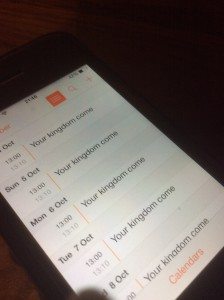“Lord, teach us to pray…”

The best learning often comes through doing. Here is an outline to let you try out following Jesus’ pattern for praying with balance – so that you can explore the impact that praying this prayer, as an disciple[1] of Jesus, might have.
You may find it helpful to spend a week, focusing each day on just one section and reflecting slowly on the prayer Jesus gave his disciples. Then, in the week following your exploration, try setting a reminder on your phone or an alarm clock to help you incorporate praying the whole prayer into the rhythm of each day.
Our father in heaven …
We come before you as adopted members of your family, profoundly grateful that you love us “as a father has compassion on his children”… (Psalm 103)
If you can manage it, spend some time relishing the privilege of being invited to join Jesus (Mk 14.36) in addressing the sovereign of the universe as ‘Abba’, my father. (Rom 8.15 Gal 4.6)
hallowed be your name.
May your name be held in holy awe, may you be revered and honoured by me, by your other followers, by all those you have created.
God’s “name” is God himself – as he is and as he has revealed himself – and so his name is already holy. Consider how the family likeness between us and our Father may allow the character of God – what he is like – to become clearer to the world around us and result in wider recognition of his holiness.
Your kingdom come, your will be done on earth as it is in heaven.
May what you want to see done be done, in my life, in our churches in our community, in the visible world you have created. May the part I play in the world’s life today contribute to making your presence and your way of doing things more visible to the eyes of my fellow human beings.
Seek today to be continually looking to God and what he is doing in the midst of the ordinary circumstances of your life, your sphere of influence. Explore the effect that having ‘what God is doing’ as your primary concern might have on your thoughts, words and actions.
Give us this day our daily bread.
We are grateful that you are willing to be involved in all aspects of our lives and sorry that we so often miss out on the peace you want to give, by holding onto our concerns – as though our worry can help to solve them. These are the aspects of my life that I specifically need to turn over to you this week: _____ and ______.
Pause to allow God to bring to your mind anyone else whose needs you could bring before him in a similar way. (See Matt 6.25…)
Forgive us our debts, as we also have forgiven our debtors.
Consider the family likeness that the Father wants to produce in us by his Spirit living in his children: love, joy, peace, patience, kindness, goodness, faithfulness, gentleness, self-control… (Gal 5. 22… See too Col 3.12-14.)
I confess that the idea of Christlikeness is often more appealing to me in theory than in practice. I ask for your forgiveness today for ______ and _______ – and for wisdom to understand how to allow you to change me. I know the hands that I have opened to receive your forgiveness need to open again to allow forgiveness to flow to those who have wronged me. I name them before you now: ________ and ask you to bless them. (Matt 6.23…) I need help with this…
And lead us not into temptation, but deliver us from the evil one.
Help me. At the moment I feel tested by ______.
Read aloud Rom 8.35-8 and reflect on the protection that surrounds you.
Exploring further …
We have come to know the prayer that Jesus taught as “The Lord’s Prayer”, but the prayer that begins Our Father… is a prayer for disciples – people learning to follow Jesus – who, like his first apprentices, are keen to be taught how to pray. (Luke 11)
“This then is how you should pray”
The fact that the gospel writers record two slightly differing versions of it, set against a backdrop of two contrasting settings, suggests that Jesus may have taught this pattern for addressing God on a number of occasions, as he moved about among people, and that Matthew records one such episode and Luke another. (See Matt 6. 9 -13 and Luke 11. 2-4.) The introduction to the prayer, reported by Matthew – “This then is how [not what] you should pray” – suggests that this is not a set form to be repeated word-for-word, but a framework for praying, a pattern for talking to God, which is intended to be worked into the rhythm of ordinary life.
We stand to los e a great deal if we ignore or misuse this prayer. Engaging well with it – by using it to pray reflectively and honestly – opens up the possibility of discovering ‘God’s grace’ at work – his generous working in us to bring about the fullness of the new life Jesus intends (John 10.10) – and experiencing right now the ‘eternal life’ which he defined as knowing “you, the only true God, and Jesus Christ, whom you have sent.” (John 17.3)
e a great deal if we ignore or misuse this prayer. Engaging well with it – by using it to pray reflectively and honestly – opens up the possibility of discovering ‘God’s grace’ at work – his generous working in us to bring about the fullness of the new life Jesus intends (John 10.10) – and experiencing right now the ‘eternal life’ which he defined as knowing “you, the only true God, and Jesus Christ, whom you have sent.” (John 17.3)
[1] Disciple: a follower, student, learner, apprentice…




